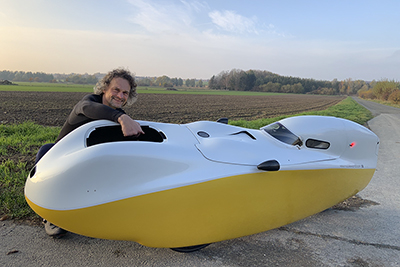VELOMOBILE: THE ECONOMICAL VEHICLE
The question that arises is: can a velomobile be considered an economical alternative to traditional forms of transportation?
The answer is YES, velomobiles can offer economic advantages suitable for different types of journeys or individuals, depending on factors such as distance, terrain, weather conditions, and personal preferences.
Let’s go into more detail about this subject!

Fuel-free operation
Velomobiles are human-powered vehicles that rely solely on your own physical effort to pedal and move forward. This means there is no need to purchase gasoline or other fuels, eliminating the ongoing cost of fuel.
Reduced commuting expenses
For commuting purposes, using a velomobile eliminates or greatly reduces transportation expenses. You won’t need to pay for public transportation fares, parking fees, or fuel costs associated with commuting by car.


Reduced maintenance costs
Compared to motorized vehicles, velomobiles have fewer moving parts and require less maintenance. There is no need for oil changes, engine repairs, or complex mechanical servicing. Regular maintenance mainly involves checking tire pressure, keeping the drivetrain clean, and ensuring the brakes are functioning properly.

Designed for efficiency
The Bülk Distance is here!
Experience uncompromising aerodynamics meets everyday practicality. The fastest Bülk ever created features next-level CFD-optimized design, revolutionary “drag and grab” access technology, and the proven Bülk performance you trust.
Insurance savings
Velomobiles generally do not require insurance, unlike motorized vehicles. This saves you the ongoing cost of premiums, deductibles, and other insurance-related expenses.


Parking savings
Velomobiles can often be parked for free or at a lower cost compared to motorized vehicles. They take up less space and can be parked in bike racks, reducing or eliminating parking fees.
Health and fitness benefits
Cycling in a velomobile provides a physical workout that contributes to better health and fitness. This can lead to potential long-term cost savings by reducing healthcare expenses related to sedentary lifestyles.


Longevity and durability
Well-maintained velomobiles can have a longer lifespan compared to many motor vehicles. The simpler mechanical design and fewer components can contribute to their durability.
Personal finance impact
Opting for a velomobile can have a positive impact on your personal finances. The money saved on fuel, maintenance, insurance, and other transportation-related costs can be redirected toward other financial goals.


Minimal wear and tear
Velomobiles put less stress on roads and infrastructure compared to heavier motor vehicles. As a result, they contribute less to road wear and tear, potentially leading to lower infrastructure maintenance costs for the community.